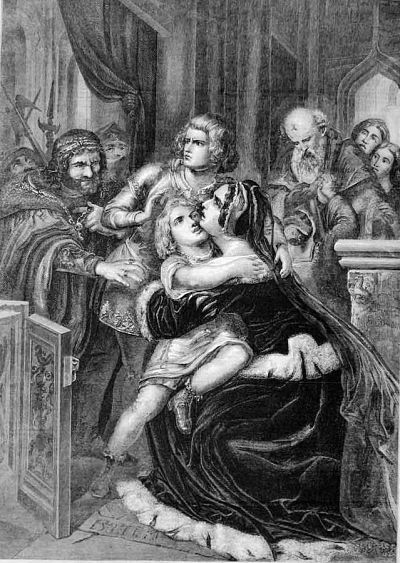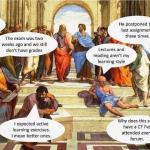 When the leaders are bad, things get to be a mess, and when things are a mess, worse most often follows. The trouble is that in the middle of a mess, the very leaders who got you into the mess will blame someone, usually one of their number, and make the mess worse. It will all be his fault, you know, the last guy . . . and the underlying problems are not addressed.
When the leaders are bad, things get to be a mess, and when things are a mess, worse most often follows. The trouble is that in the middle of a mess, the very leaders who got you into the mess will blame someone, usually one of their number, and make the mess worse. It will all be his fault, you know, the last guy . . . and the underlying problems are not addressed.
This happens in nations, churches, and organizations.
Shakespeare pictures the failure to clean up the heart of a mess in his tragedy Richard III. Richard is such a loathsome fellow in the play that it is easy to miss the truth: he is one of a community of regicides and usurpers. The English nobility decided nobody could be worse than Richard II as King of England (#neverRichard), but after fratricidal civil war, suffering, murder, and rapine, ended up with Richard III. Richard II was a weak king, but Richard III was an evil ruler.
The opening scenes of the play show Richard’s brother Edward, dying, as trying to create peace out of the band of rebels that had helped him seize the throne. Having created a fractious state, he tries to induce them to hug and make it up. He is naive: a throne won in battle and murder will be sustained only by further murder. To his credit, Edward is not willing to go that far, but it means he never should have started down the road to civil war. He is man too good to be a tyrant and too bad to be loyal.
Richard III was not afraid to kill: brother, nephews, common folk. He wanted power and would do what it took to get it. A sure sign that a system is broken is when (Act 3.7) good men cease to be able to tell the truth. Evil is defended as good and good as evil, even though everyone knows the truth.
The people around Richard, Edward’s Queen and her favorites, were too precious to openly murder. They were thieves who wanted a good name and were no match for Richard III. They are rebuked by the last Queen they deposed as hypocrites and have no response: shallow, changeable, governed not by love of country but by love of power. So it is with so many of nations or organizations. Bad leaders will seize an organization, but then try to be “good.” They end up stooges for a worse evil and then feel righteous as they perish. Good cannot be done by cutting corners, by casting friends aside, or by devious means. Ruin is the happiest result, tyranny the worst.
The Bible shows this truth in the divided kingdom of Israel when Jehu overthrows the wicked reign of Jezebel and the children of Ahab. Jehu is better than Ahab, but not righteous. Once Jeroboam the son of Nebat set Israel on an idolatrous course, nothing very good ever came. Some idolaters were better than others, but none walked in the ways of God.
What does a nation, organization, or family do if they find themselves off to a “bad start?” The Biblical answer is repentance, restitution, and a radical change of direction. The old order needs a deep revival and cleansing, a new start, and even then (as Josiah of Judah found), such revival may merely put off national judgment. Something new must come. In the play Richard III, the new chance comes in the person of Henry VII who unites the warring factions finally. With Israel, it would never come. For Judah, it would only come after Babylonian exile in a remnant that returned to the land.
To go forward, England must remove Richard, but also not merely blame Richard, he is just cashing in on the foul failures of the previous regime. If you are in a church or organization in peril, don’t replace Richard with more of the same: find Henry. When it comes to the United States of America, we must hope that the election of 2016 is Bosworth, ending a bad era and bringing peace, and not a Tewkesbury, the battle that made inevitable the reign of the tyrant: Richard III. May it come to all of us that we can say in truth:
Now civil wars are stopped: peace lives again.
That she may live long here, God say: ‘Amen.”
————————————————–
*Shakespeare is using historical figures to make a point. I am not claiming his Richard II or Richard III are just like the historical people, just that he is using them to make an applicable point. I am discussing Shakespeare’s Richard III, not the man Richard of York now buried in Yorkminster.
William Shakespeare went to God four hundred years ago. To recollect his death, I am writing a personal reflection on a few of his plays. The Winter’s Tale started things off, followed by As You Like It. Romeo and Juliet still matter, Lady Macbeth rebukes the lust for power, and Henry V is a hero. Richard II shows us not to presume on the grace of God or rebel against authority too easily. Coriolanus reminds us that our leaders need integrity and humility. Our life can be joyful if we realize that it is, at best, A Comedy of Errors. Hamlet needs to know himself better and talks to himself less. He is stuck with himself so he had better make his peace with God quickly and should stay far away from Ophelia. Shakespeare gets something wrong in Merchant of Venice . . . though not as badly as some in the English Labour Party or in my Twitter feed. Love if blind, but intellectualism is blind and impotent in Love’s Labours Lost. Brutus kills Caesar, but is overshadowed by him in Julius Caesar. We should learn not to make Much Ado about Nothing. We might all be Antony, but if we would avoid his fate then we must avoid flattery and the superficial love of Troilus and Cressida. We are fools, but our goal should be to accept it and not to degenerate into Biblical fools during our Midsummer Night’s Dream. Richard III is a symptom of a bad leadership community.











